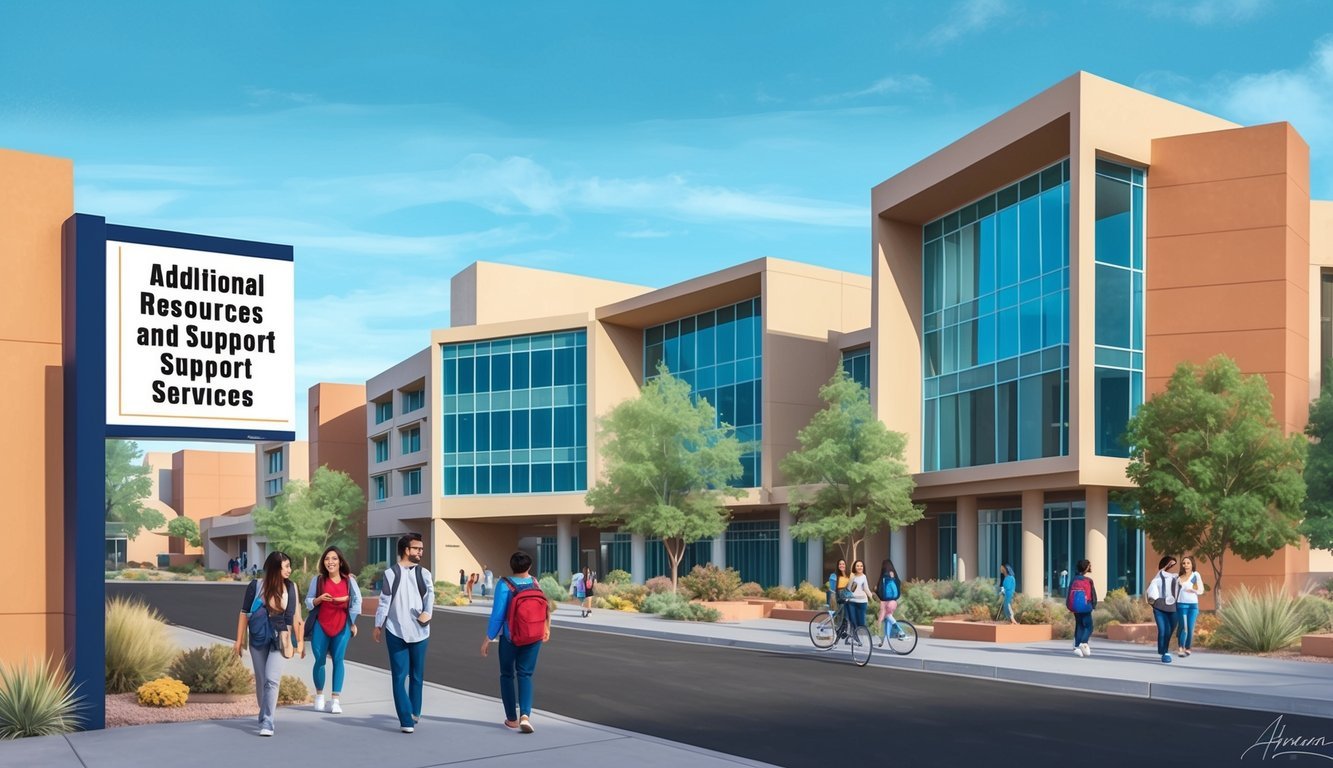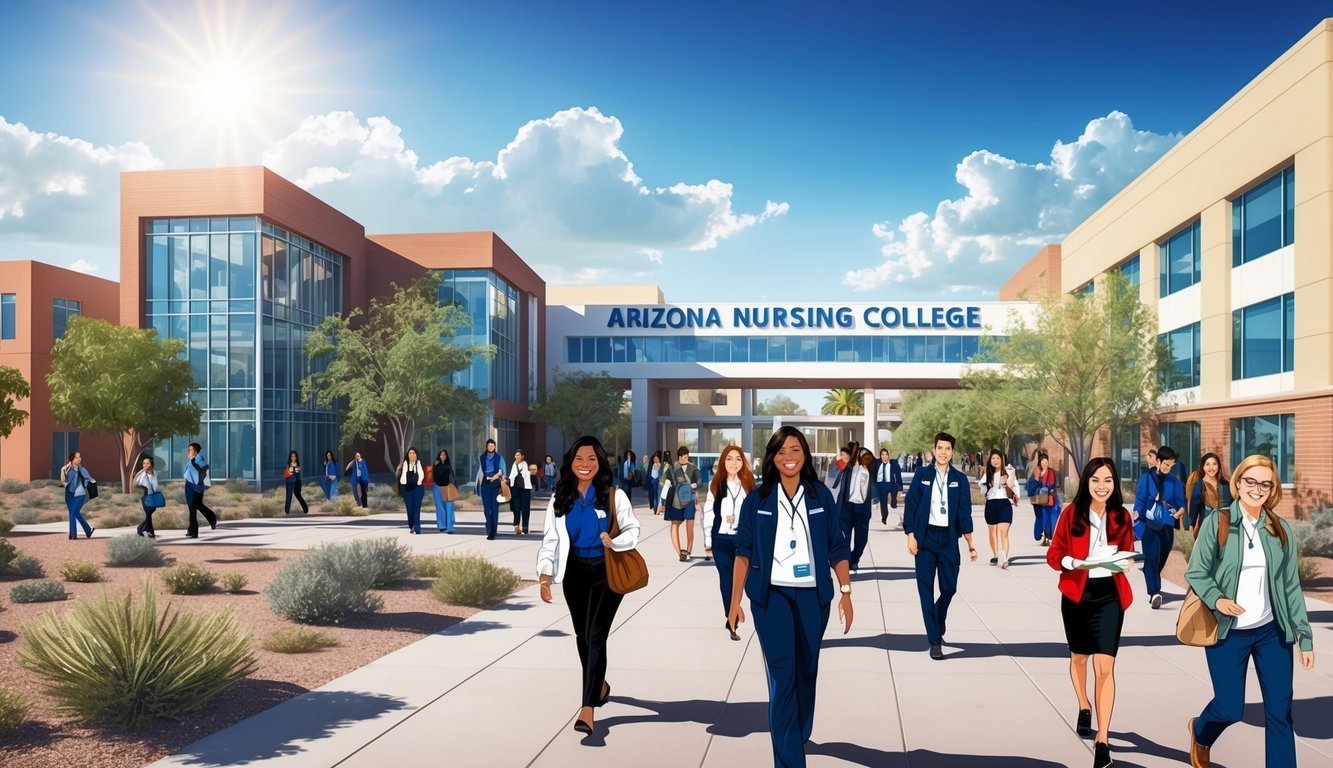Arizona is home to several prominent nursing colleges that offer a variety of programs tailored to meet the needs of aspiring healthcare professionals. The University of Arizona College of Nursing provides a comprehensive Bachelor of Science in Nursing (BSN) program designed to equip you with essential skills in patient care and healthcare delivery. With options for traditional and accelerated pathways, these programs cater to different timelines and learning preferences.
In addition to the University of Arizona, institutions like Arizona College of Nursing also play a crucial role in shaping the future of nursing.
They provide programs that emphasize not only academic knowledge but also the practical experience necessary to excel in real-world healthcare settings.
You will benefit from distinguished faculty expertise and cutting-edge research initiatives that enhance your educational experience.
As you consider your options, exploring the range of nursing programs available in Arizona can help you make informed decisions about your education and career trajectory.
These programs not only prepare you for licensure but also enable you to contribute meaningfully to the evolving healthcare landscape.
For more information on the University of Arizona College of Nursing, you can visit their official website.
Educational Programs Overview

Arizona nursing colleges offer various educational programs aimed at preparing you for a successful nursing career.
Each program is designed to meet distinct needs and preferences, making it essential to understand what each pathway entails.
Bachelor of Science in Nursing
The Bachelor of Science in Nursing (BSN) program at Arizona College of Nursing focuses on a comprehensive nursing education.
This CCNE-accredited program combines classroom instruction with hands-on clinical experience, allowing you to develop essential skills.
Key components include:
- Core Nursing Courses: Covering vital topics such as pharmacology, adult health, and pediatrics.
- Clinical Rotations: Providing real-world experience in diverse healthcare settings.
- Advanced Simulation Facilities: Enhancing your learning with state-of-the-art technology.
Classes are available conveniently, with new sessions starting every eight weeks, making it easier for you to fit education into your schedule.
Hybrid BSN-IH Pathway
The Hybrid BSN-IH Pathway is tailored for individuals with a non-nursing bachelor’s degree who wish to transition into nursing.
This program combines online coursework with in-person clinical training, offering flexibility without sacrificing the quality of education.
Highlights of this program include:
- Online Learning: Allowing you to complete theory-based classes at your own pace.
- In-Person Clinicals: Ensuring you gain necessary hands-on experience.
- Supportive Environment: Faculty provide personalized attention to help you succeed.
This pathway allows you to earn your BSN while balancing other commitments, making it a practical option for busy professionals.
3-Year BSN Program
The accelerated 3-Year BSN Program is designed for those looking to enter the nursing field quickly.
You’ll complete the program in an intense, focused format that combines rigorous coursework with clinical practice.
Key features include:
- Accelerated Study Plan: Completing your degree in three years instead of the traditional four.
- Comprehensive Curriculum: Covering all essential nursing topics and skills.
- Robust Clinical Experiences: Ensuring you’re well-prepared for the workforce upon graduation.
This program is ideal for motivated individuals who want to jumpstart their nursing careers efficiently.
Accreditation and Licensure

Accreditation and licensure are critical components of your nursing education.
They ensure that the programs meet quality standards and that you are prepared for professional practice.
Here, you will find important details regarding institutional accreditation, programmatic accreditations, and specific licensure requirements.
Institutional Accreditation
Institutional accreditation verifies that a college or university meets certain quality standards in education.
For example, the Arizona College of Nursing is accredited by the Accrediting Bureau of Health Education Schools (ABHES).
This accreditation indicates that the institution fulfills rigorous educational criteria.
Furthermore, the University of Arizona College of Nursing is accredited by the Commission on Collegiate Nursing Education (CCNE).
Institutional accreditation is essential for federal financial aid eligibility and is often required for further education.
Programmatic Accreditations
Specific nursing programs also require programmatic accreditation.
The Bachelor of Science in Nursing (BSN) at Arizona College of Nursing holds CCNE accreditation.
This marks the program as having met high educational standards and prepares you for eligibility for the NCLEX-RN exam.
Programmatic accreditation not only enhances the prestige of your degree but also assures potential employers of the quality of your education.
It’s important to choose a program that holds these accreditations to ensure a recognized and respected credential.
Licensure Requirements
To practice as a registered nurse (RN) in Arizona, you must pass the NCLEX-RN exam and meet other state-specific requirements.
Ensure your program qualifies you for this eligibility, as designated by the Arizona Board of Nursing.
In addition to passing the exam, you will need to submit a completed application along with any required fees.
Specific documentation may be needed, such as proof of graduation and fingerprints for background checks.
Staying informed about these requirements is vital for a smooth transition from education to practice.
Clinical and Simulation Learning
In nursing education, practical skills are essential for successful patient care.
Your training will involve both clinical experiences and simulation labs, providing you with invaluable opportunities to develop and refine your nursing skills.
Clinical Experiences
Clinical experiences form the backbone of your nursing training.
Through clinical rotations, you engage directly with patients in various healthcare settings.
This hands-on experience allows you to apply theoretical knowledge to real-life scenarios.
You will rotate through different specialties, including:
- Medical-Surgical Units
- Pediatrics
- Obstetrics
- Mental Health
These rotations enable you to interact with diverse patient populations and healthcare teams.
You will learn to assess patient needs, administer medications, and develop care plans under the guidance of experienced clinical instructors.
This mentorship is crucial for acquiring the skills necessary for effective nursing practice.
Simulation Lab
The simulation lab is a critical component of your training at Arizona nursing colleges.
For instance, the Gilbert Simulation Center provides a realistic environment equipped with high-tech patient simulators.
In this space, you will practice essential nursing procedures, such as:
- Vital Signs Monitoring
- Patient Assessment
- Advanced Clinical Skills
Simulation labs allow for the repetition of procedures in a safe setting.
You can make mistakes and learn from them without risking patient safety.
This method enhances your confidence and prepares you for situations you will encounter during clinical rotations.
By participating in simulation scenarios, you will master both basic and advanced nursing practices, ensuring you are well-prepared for the demands of real-world nursing.
Research and Outcomes

Research and healthcare outcomes are essential components of nursing education in Arizona.
These areas contribute significantly to the advancement of nursing practice and understanding of patient care.
Healthcare Outcomes
Healthcare outcomes reflect the effectiveness of nursing practices and interventions.
In Arizona, institutions are actively involved in implementing evidence-based strategies to improve patient care.
For example, initiatives aimed at enhancing diabetes management among the Hispanic/LatinX population focus on culturally tailored interventions.
The Blue Ridge Institute for Medical Research informs how research shapes healthcare outcomes by providing data analytics and insights.
Their findings guide nursing programs, enabling you to understand the impact of care practices on patient recovery, satisfaction, and overall health.
Research Initiatives
Research initiatives in Arizona focus on solving complex healthcare challenges.
Programs such as the PhD in Nursing and Healthcare Innovation emphasize conducting significant research that addresses health disparities and improves equity in care delivery.
Collaborative projects bring together various disciplines to explore innovative solutions.
For instance, ethical considerations in research are a focus within academic programs, ensuring that the outcomes not only enhance healthcare but also align with best practices in ethics and professionalism.
These initiatives enhance your understanding of the dynamic field of nursing and inform future practices.
Career Pathways in Nursing
Nursing offers various pathways that can enhance your career development and provide opportunities for transition into roles such as Registered Nurse (RN).
Understanding these pathways can help you make informed choices about your education and career progression.
Nursing Career Development
As you embark on your nursing career, consider the importance of structured development opportunities.
Featured below are various pathways you can consider for professional growth:
| Career Pathway | Description |
|---|---|
| BSN Programs | Bachelor of Science in Nursing (BSN) equips you with comprehensive skills necessary for effective patient care. You might explore programs like those offered by the University of Arizona College of Nursing. |
| Certifications | Specialty certifications, such as Certified Nurse Practitioner (CNP) or Clinical Nurse Specialist (CNS), can enhance expertise and marketability. |
| Continuing Education | Engaging in workshops and courses helps keep your knowledge current in an ever-evolving field. |
| Networking | Joining professional organizations allows you to connect with peers and access career resources. |
Professional growth relies on ongoing learning and practical experiences, ensuring you stay competitive in the nursing field.
Transition to Registered Nurse
Transitioning to a Registered Nurse is a significant step in your nursing career.
The following are vital aspects to consider:
-
Degree Programs: Pursuing a Bachelor of Science in Nursing (BSN) or an Associate Degree in Nursing (ADN) is essential to start your RN journey. Many programs, including options at Arizona State University, offer flexible formats, including online classes.
-
Licensure Requirements: To practice as an RN, you must pass the NCLEX-RN exam following your degree completion. This exam assesses your readiness for real-world nursing challenges.
-
Mentorship and Support: Seek opportunities for mentorship. Engaging with seasoned nurses can provide invaluable insights and emotional support as you navigate your responsibilities as an RN.
By understanding the transition process and available resources, you can ensure a successful move into the role of Registered Nurse, ready to tackle the challenges of the healthcare industry.
Additional Resources and Support Services

At Arizona Nursing College, a variety of resources and services are available to enhance your educational experience and promote community health.
These offerings include support services tailored for students and initiatives aimed at improving population health.
Support Services for Students
Arizona Nursing College provides comprehensive support services designed to assist you throughout your academic journey.
These services include access to crisis support, campus health resources, and scholarships for eligible students.
You can explore various student organizations that foster a sense of community and connection.
Programs like the Indians in Nursing: Career Advancement and Transition Scholars (INCATS) focus on empowering Indigenous students.
Additionally, resources are available for campus accessibility, mental wellness, and academic support.
Engaging with these services early can significantly impact your success and well-being while pursuing your nursing degree.
Community and Public Health Initiatives
The University of Arizona is committed to promoting community and public health through various initiatives.
These programs focus on health promotion and disease prevention, aligning with the college’s mission to advance population health.
One such initiative is the collaboration with local health organizations to enhance community health.
This engagement provides students with practical experiences that are instrumental for their future career.
Additionally, the college emphasizes educational environments that support health literacy.
They encourage students to participate in workshops and outreach programs.
By participating in these initiatives, you can contribute to meaningful change while gaining valuable skills that enhance your nursing practice.

